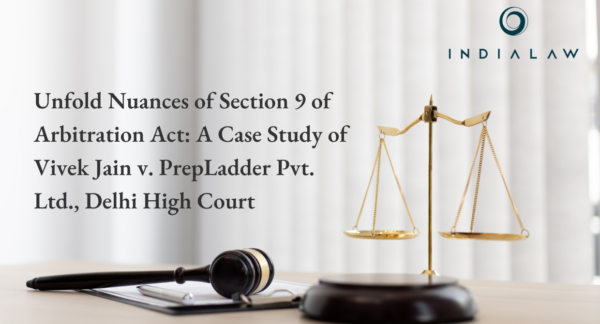Commercial Courts Act, 2015 contd. : Important changes in provisions of CPC


PART II – IMPORTANT CHANGES IN THE PROVISIONS OF CIVIL PROCEDURE CODE, 1908 (“CPC”)
By J.Mandakini & Varsha G Subramanian
The Act provides for a Schedule which amends certain provisions of CPC. These provisions are applicable to Commercial Disputes of Specified Value and the Commercial Court or Commercial Court shall follow the amended provision. The Act has clarified that the provisions of the CPC as amended by the Act would have an overriding effect over any rules of the High Court, or the amendments to the CPC made by a State Government.
Some of the important changes brought by the Act are:
- Costs – The costs ordered by the court in relation to a suit are governed by Section 35 of CPC. The said section provided discretionary powers to the court while determining the costs. The Act has substituted the said section to provide a general rule for payment of costs by the unsuccessful party. The Court may deviate from the general rule after recording the reasons in writing.
The order for costs would include fees and expenses of the witnesses, legal fees, and broadly, any fees involved in furtherance of the proceedings. The court has to also consider the conduct of parties, whether the party has succeeded partially if not wholly, whether frivolous claims or counterclaims were made, whether an offer for settlement was unreasonably rejected.
2. Procedure for Summary Judgment – The Act introduces a system of “Summary Judgment” through a new Order XIII-A in the CPC. Summary judgment is given by the court without recording oral evidence in the following scenarios:
(a) the plaintiff has no real prospect of succeeding on the claim; or
(b) the defendant has no real prospect of successfully defending the claim; or
(c) in the absence of any other compelling reason for recording of oral evidence.
An applicant may apply for summary judgment at any time after summons has been served on the defendant. However, no such application will be entertained after the court has framed the issues in respect of the suit. An application for summary judgment shall not be made in a suit if that is originally filed as a summary suit under Order XXXVII. The applicant may rely on documentary evidence in support of its application. The date for hearing a summary judgment of a commercial dispute must be fixed, after giving a notice period of thirty days to the respondent. The respondent has to file his reply within thirty days of the receipt of notice of application of summary judgment or notice of hearing, whichever is earlier.
3. Pleadings in a commercial dispute – Order VI of CPC deals with pleadings. The form of pleadings in commercial dispute will be as per High Court Rules or Practice Directions provided for such disputes. A new Rule 15A has been inserted, which pertains to verification of pleadings in a commercial dispute. In the absence of verification, the pleadings cannot be relied as evidence. Every pleading has to be verified by an affidavit signed by the party, or one of the parties to the proceedings or any person who is acquainted with the facts of the case and authorized by such parties. If the pleading is amended, the same has to be verified.
4. Delay in filing written statement – The maximum period within which the written statement could be filed is 90 days under CPC. The Act has increased the time period to 120 days. Accordingly the Act has amended Order V of CPC dealing with issue of summons and Order VIII of CPC pertaining to filing of written statement by the defendant.
As per the provisions of CPC, if a party fails to present written statement, the court shall pronounce judgment or make an order in relation to the suit. The Act states that, the order made by the court cannot extend the time period of 120 days.
5. Procedure for disclosure, discovery and inspection of documents before the Commercial Courts – Order XI of the CPC lays down the procedure for discovery and inspection of the facts of the suit through interrogatories. The Act has substituted this Order to include disclosure, along with discovery and inspection of documents.
Under the new provisions, parties are required to file a list of all documents and the photocopies of all these documents at the stage of filing of plaint/written statement, specifying inter alia, in whose possession the documents are currently (whether the plaintiff or the respondent or any other person). They are mandated to include a declaration on oath stating that they are not in possession of any documents other than the photocopies of the documents they had already placed on record. The parties are not allowed to rely on any documents other than the ones mentioned in the list and whose photocopies had been filed, without leave of the Court. However, the Act has granted discretion to the Court to award exemplary costs against a party who willfully, unreasonably, wrongfully, or even negligently failed to disclose all documents pertaining to the suit in their possession.
6. Electronic records – The evidentiary value of electronic records has already been recognized under the provisions of Indian Evidence Act, 1872 and Information Technology Act, 2000. The Act has incorporated the relevant provisions providing procedural rules in respect of the same under the new Order XI of the CPC.
7. Written arguments – Order XVIII of the CPC deals with hearing of suit and examination of witnesses and consists of provisions pertaining to written arguments. As per the new provisions in this Order inserted by the Act, parties have been mandated to submit concise written arguments under distinct headings within four weeks of commencement of oral arguments. Revised written arguments may be filed within one week of the conclusion of arguments. Earlier, no such time restriction had been stipulated.
8. Amendments in procedure related to Affidavits – The Act has inserted new Rules in Order XIX of the CPC, in addition to the existing procedure related to affidavits. The courts have been empowered to control the evidence, by being permitted to decide the issues which require evidence, and the manner in which such evidence is to be recorded. The Commercial Courts even have discretion to exclude evidence that would otherwise have been produced by the parties. They have been empowered to redact any affidavits, which in their view does not constitute admissible evidence.
9. Time period for pronouncing judgment – Rule 1 of Order XX of the CPC stipulates that judgment must be pronounced within a maximum time period of 60 days from the date of conclusion of hearings. The Act has provided a maximum time period of 90 days commencing from the date of conclusion of arguments, for pronouncing the judgment.
10. Case Management hearing – An international practice of case management hearing has been introduced in India for the first time through a new Order inserted into the CPC- Order XV-A. This allows the Court to make a time line, and fix dates for the proceedings of the matter.
The first Case Management Hearing has to be held by the court within four weeks from the date of filing of affidavit of admission or denial of documents by all parties to the suit. Arguments have to be closed within six months of the first Case Management Hearing.
It provides that no adjournment for Case Management Hearing would be entertained for the sole reason of non-appearance of counsel. If such application had been made in advance, it would be accepted, upon payment of costs.
Non-compliance with Case Management Hearings shall be condoned by the Court only upon payment of costs, but it might also result in forfeiture of the party’s right to conduct the suit. In extreme cases of willful non-appearance, the Court has the discretion to dismiss the plaint.
11. Disposal of a suit at first hearing – Order XV of CPC deals with disposal of suit at first hearing. The said Order has been omitted by the Act.
Read Part I : Establishment of Courts and Division for commercial disputes




